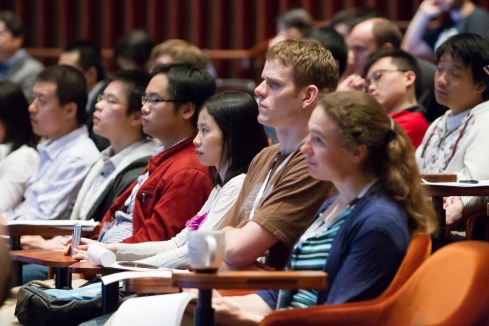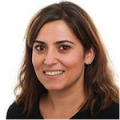Detailed computational models are critical for elucidating neuronal and network function. They enable different levels of description to be linked, a wide range of neurophysiological experiments to be interpreted and quantitative predictions to be made. These factors are important for understanding large-scale complex systems, like neural circuits; however, more extensive use and scaling up of these data driven models pose challenges in ensuring that models are scientifically rigorous, as well as accessible and usable by both theoretical and experimental researchers alike. This conference will bring together a range of experimentalists, theoreticians and neuroinformatics developers with the aim of facilitating a global, open infrastructure for collaborative model development in neuroscience.
Registration for this meeting is closed.
View Full DetailsThis meeting will bring together researchers working on action selection in a range of model organisms, including monkey, mouse, insects, leech and C. elegans. It will include both theorists and experimentalists taking top-down and bottom-up approaches to the problem. Topics will cover computational models, physiological correlates and circuit implementations of action selection in various model systems.
Registration for this meeting is closed.
View Full DetailsRegistration for this meeting is now closed.
Organized by Shaul Druckmann, Ann Hermundstad, Sandro Romani and Herve Rouault, this workshop is intended as a "by the students, for the students" meeting. Participants will include only students and postdocs doing theoretical neuroscience research.
Over the course of the week, attendees will present their own work, as well as a more in depth tutorial on the techniques used in their research. The goal is to encourage uninhibited and detailed technical discussion among young theoreticians, a deeper understanding of the diverse techniques used in modern theoretical neuroscience, and hopefully a stronger sense of community. We see this as a unique learning opportunity for everyone involved and intend for it to be an enjoyable experience.
We are interested in those who will be able to follow the intense schedule and contribute to discussions, and we especially encourage applications from female scientists.
In order to maintain a small group atmosphere, allowing for extensive interactions and presentations by everyone, space at the workshop is limited. All participants are expected to stay for the duration.
Janelia will cover the cost of accommodation, meals and reasonable travel expenses.
APPLICATION DEADLINE: JUNE 15, 2016 (11:59 pm).
View Full Details

Organized by Kristin Branson, Srini Turaga, Jeremy Freeman and Stephan Saalfeld, this workshop is is intended as a "by the students, for the students" meeting. Aside from the organizers, participants will include only students and postdocs, with a diversity of expertise and backgrounds.
Over the course of the week, attendees will teach each other new techniques, discuss fundamental principles, and learn about the exciting computational challenges in neuroscience, imaging, and behavior. They will present their work and run tutorials and coding sessions on the techniques they use.
The workshop will be interactive, intense, and interdisciplinary. We see it as a unique learning opportunity for everyone involved and intend for it to be an enjoyable experience.
We encourage applicants from across the realm of computer vision, machine learning and computational neuroscience, including the areas of image analysis, reinforcement learning, deep learning, and statistics and probabilistic modeling.
In order to maintain a small group atmosphere, allowing for extensive interactions and presentations by everyone, space in the workshop is limited. Participants are expected to stay for the duration
Janelia will cover the cost of accommodation, meals and reasonable travel expenses.
APPLICATION DEADLINE: JUNE 30, 2016 (11:59 pm).
View Full DetailsRegistration for this meeting is now closed.
Organized by Alla Karpova, Josh Dudman and Vivek Jayaraman, this workshop provides an exciting opportunity for graduate students and post-doctoral fellows interested in the circuit basis of behavior to present their research and discuss bold ideas for the future, while also discovering potential independent early-career options at Janelia.
The meeting is open to a broad array of ideas and approaches in neural circuits and behavior. We will thematically tune the agenda to explore some of the issues raised by participants.
Over the course of five days, attendees will present their work, partake in lively discussions on key problems and obstacles in the field, and indulge in informed speculation about conceptual and technical approaches that might be useful for future progress.
The focus of the meeting will be on junior scientists, but we will also host plenary talks from senior investigators. It will be interactive and intense. We want participants who are comfortable not only presenting their own ideas and results, but also actively contributing to discussion. We will aim to ensure that discussions are freewheeling, but also respectful and inclusive, and that the atmosphere is both fun and productive. Attendees should feel free to come with half-baked ideas and expect an audience keen on talking through those ideas! We see it as a unique learning opportunity for everyone involved.
In order to maintain the small group atmosphere that we believe is necessary for extensive interactions and discussion, space in the workshop is limited. Participants are expected to stay for the duration.
Janelia will cover the cost of accommodation, meals and reasonable travel expenses.
View Full DetailsThis is the fourth installment of the "Genetic Manipulation of Neuronal Activity" conference at Janelia. Presentations will highlight recent advances in the development of new genetic reagents for the exogenous control of neural circuit activity, including naturally evolved light-gated ion channels and pumps, mutagenized temperature-sensitive synaptic transmission components, rationally designed photo-switches, magnetoreceptors and "orthogonal" drug/receptor pairs, among others. We are bringing together leaders in the field to review progress in the design and use of current tools and, more importantly, to discuss the development of novel tools and their potential applications.
Registration for this meeting is closed.
View Full DetailsTo understand the circuit principles by which behavioral choices are made and the chosen behaviors executed, it is essential to determine the architecture of networks that mediate these functions with synaptic resolution, and determine the causal relationships between the structural motifs and function. The genetically tractable insect model system, the Drosophila larva, with a ca. 10,000-neuron nervous system and uniquely identifiable neurons is ideally suited for combining three levels of analysis: i) circuit mapping using electron microscopy (EM); ii) physiological measurements of neural activity and iii) neural manipulation in freely behaving animals to dissect the circuit principles of behavior selection and generation. Recent advances in electron microscopy techniques enable rapid reconstruction of larval circuits. Recently developed genetic toolkits enable selective manipulation and recording from uniquely identified neurons. At the same time recent behavior detection algorithms enable high resolution and high-throughput characterization of a range of larval behaviors. This high level of anatomical resolution, coupled with the genetic tools and fine-detail behavioral analysis, makes the fly larva an excellent model system for moving from neural circuits to behavior. This meeting will feature the most recent advances in the study of larval behavioral neurogenetics, with an emphasis on motivational and memory systems.
Registration for this meeting is closed.
View Full DetailsAs the fifth installment in this series, we will showcase the development of cutting-edge tools and technology for imaging, from cells to intact animals. Sessions will cover the design and discovery of new fluorescent proteins (and intriguing alternatives), and their incorporation into sensors for signaling molecules and cellular states. Innovative imaging modalities making use of such reagents, as well as biological discoveries gleaned from such experiments, will also be presented. It is our hope that the meeting can present a clear picture of how far these tools have come in recent years, and what additional reagents and capabilities are required to continue the advance of the Age of Light.
Registration for this meeting is closed.
View Full DetailsMicroED is a technique that uses electron diffraction to facilitate structure determination from sub-micron sized crystals, eliminating the need to grow large crystals. MicroED uses equipment and procedures that are standard on many cryoTEM’s, and because of this the technique can be easily adopted in labs and facilities around the world. To facilitate the widespread use of MicroED, Janelia group leader Tamir Gonen is offering this workshop to teach microscopists how to perform the technique and adopt it at their own institutions.
There is no registration fee for participation, and Janelia will provide on-site housing and meals. Attendees are expected to cover their own travel expenses and must be able to stay for the duration.
This 3-day joint workshop of the Mathematical Sciences Research Institute (MSRI) and Janelia Research Campus is organized by Larry Abbott (Columbia University), David Eisenbud (Mathematical Sciences Research Institute) and Mimi Koehl (University of California, Berkeley).
Navigation in flies, mosquitos and ants is an interesting scientific problem that has considerable societal importance because of their role as disease vectors. This meeting will address two important aspects of navigation: 1) how are locations and orientations in space computed, represented and used in the insect brain, and 2) how do interactions between an organism and its environment affect its ability to navigate.
Recent advances in our understanding of the internal representation of orientation in the fly brain and of mechanisms used by mosquitos to locate prey are the inspiration for choosing this topic. A comprehensive picture of the internal computations that insects use to localize and orient themselves in space is beginning to develop.
Mosquitoes find their prey by tracking the plumes of carbon dioxide and water vapor they create in the atmosphere. This plume is an extremely complicated, nearly fractal object. Accounting for its structure, using fluid mechanics, and understanding how a creature might use the complicated information available to its senses as it flies through the plume is one of the interesting mathematical problems that we aim to address at the meeting.
The goal of the workshop is to bring together mathematicians, physicists and neuroscientists working on these aspects of the navigation to share the latest developments in the field. The meeting is aimed at fostering work that will synthesize the different pieces into a significant picture of the whole.
Since the meeting will involve researchers from different fields, the meeting will begin with introductory overview talks from the different areas, and then proceed to a series of research talks presenting the most recent findings. Plenty of time will be kept for discussions and informal interaction. A final session may bring together the “next” problems that may guide the further development and interaction of the fields represented.
Housing and meals will be provided to those accepted to attend the workshop. Some travel funding may be available. To apply to attend, please fill out the registration form here.
APPLICATION DEADLINE: OCTOBER 3, 2016
View Full DetailsStay Updated
Sign up to receive periodic updates and announcements about Janelia’s programs and events, including conferences and workshops, public lectures, educational and career opportunities, and more.
Conference Travel Scholarships
Available to grad students and postdocs whose labs do not have travel funding and who would otherwise be unable to attend. Interested applicants must register and note their request for travel support on the registration site.





